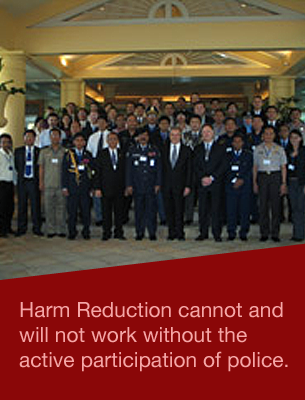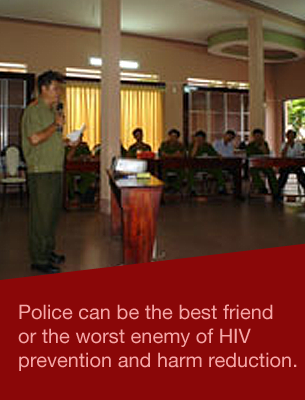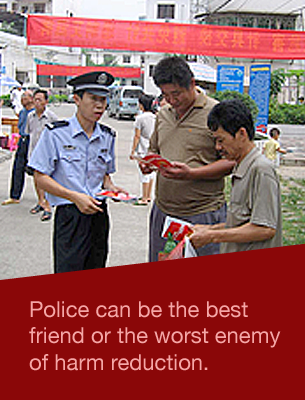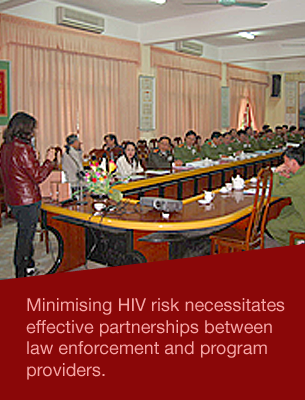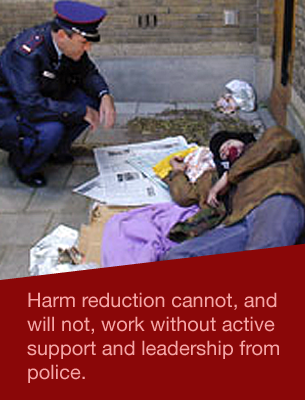International Police Advisory Group: Mission Statement
To educate, inform, advocate and engage police, individually and through their agencies, about the importance of the police and other law enforcement agencies. To partner with health and other sectors in addressing the complex social issues that underlie the HIV epidemic, and to provide leadership in showing the way forward.
IPAG convened its first meeting at the inaugural Law Enforcement and Public Health (LEPH) Conference in November 2012. View current membership list here.
Meet some of our IPAG members:
 Frank Hansen – Chairperson
Frank Hansen – Chairperson
Superintendent Frank Hansen was a member of the New South Wales Police Service for over 40 years until his retirement at the end of 2010. The majority of Frank’s service was devoted to providing key policy advice on drug and alcohol issues to the NSW Police and Government particularly as it related to legislative options, policing practices and their interrelationship to the provision of public health services.
In the 10 years prior to his retirement Frank chaired the Intergovernmental Committee on Drugs and was a member of the Australian National Council on Drugs (ANCD).
Outside of policing, Frank has been on the Board of the Ted Noffs Foundation for a number of years and is currently the Deputy Chair. He has presented at numerous national and international conferences as well as providing consultancy advice to United Nation agencies in Asia and Russia. In 1994 Frank was awarded the Australian Police Medal for distinguished service in drug law enforcement.
Interview with Frank Hansen
 Greg Denham
Greg Denham
Greg Denham was a member of both Victoria and Queensland Police. His policing experience includes uniform general duties, investigation, task force, crime prevention and pro-active programs. Greg spent a considerable amount of his policing career delivering training to police on drug harm reduction. Since 2005 Greg has worked internationally in developing policies and practices that support the prevention of HIV through harm reduction. During this period he was the Policing Adviser and Trainer for both the Asia Regional HIV Project and the HIV/AIDS Asia Regional Project at the Burnet and Nossal Institutes. Greg has worked extensively across South East Asia and more recently in East Africa in this role. In 2007 Greg formed the Coalition of Police Supporting Harm Reduction, the forerunner to LEAHN, and is committed to working with police to ensure that HIV and other drug-related harms have minimal impact on those most at risk and the broader community.
Melis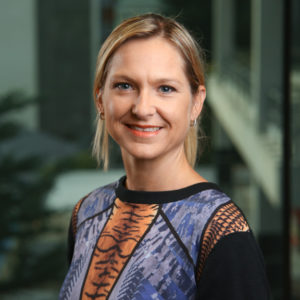 sa Jardine
sa Jardine
Melissa Jardine is a Director for the Global Law Enforcement & Public Health Association (gleapha.wildapricot.org). GLEPHA is a unique organisation founded to further policy and practice that underpins the growing and significant developments which recognise the inter-related nature of law enforcement and public health. Melissa is also Gender Advisor & Communications Manager for the Centre for Law Enforcement & Public Health (www.cleph.com.au). She has written and delivered a range of international police training packages regarding HIV prevention, harm reduction approaches to drug use and sex work, and police-public health leadership.
Melissa was a Victoria Police officer for 10 years (2001-2011) working at the frontline and in criminal investigations. She completed a Master of Asian Studies at Monash University with a focus on the relationship between provincial economic growth in China and capital punishment for economic crimes, and studied Counter-terrorism in ASEAN. Followed by a Master of Philosophy at The University of Melbourne, examining police responses to the implementation of drug harm reduction programs in Hanoi, Vietnam. The research highlighted the complexities of the police response role to illicit drug use in an environment characterised by a conflicting regulatory framework, and political and organisational incentives predisposing police to certain decisions. Melissa has long term interest in the development of policing in Asia and is currently researching the professionalisation of police in Vietnam for her PhD at UNSW. It includes a focus on how to expand the role of women in policing in Vietnam.
Alex Zelic henko
henko
Aleksandr (Alex) Zelichenko, PhD, is a recently retired Police Colonel and Director of Central Asian Drug Policy Center. He is also a member of Journalists Association of Kyrgyzstan and National Writers Association of Kyrgyzstan.
Alex is one of the founders and first leader of the Special Drug Control Service under the Ministry of Internal Affairs, The State Commission on Drug Control under the Government of Kyrgyz Republic. He has more than 37 years of experience in the Kyrgyz State Police Service at operational, supervisory levels, command level and in police training (1978 – 2007), in a wide range of Police services as Police Drug Control Service, Criminal Police, Community Police and Police Reforming as well as extensive experience in multi-cultural and post conflict environments during Cross-Border Cooperation Projects in Central Asian region. Alex has served in UN Missions in Kosovo, Macedonia and Serbia/Montenegro.
Alex has trained more than 700 police officers from Kosovo and Serbia in crime prevention, general policing, anti-drug activities and community policing Issues. He worked as an international drug policy expert for IHRD/OSI from 2004-7. Alex is currently the Coordinator of EU Central Asian Drug Action Program – CADAP-5 and moderates the Russian version of the LEAHN
Krisanaph ong Poothakool
ong Poothakool
Associate Professor Police Lieutenant Colonel Dr.Krisanaphong (Tong) Poothakool has served more than 25 years in Royal Thai Police (RTP). He began his police career at the Crime Suppression Division (CSD) in Bangkok aiming to control and suppress serious crimes throughout the country. While working at CSD, he was chosen to work with senior administrators in Thailand including the Minister for Science, Technology and Environment, Chief of Central Investigation Bureau, Deputy Chief of Metropolitan Police Bureau and Deputy Chief of Central Investigation Bureau. In 2004, Tong took a break from his police career to study a Ph.D in the UK. When he returned to the Royal Thai Police in 2009, he was nominated as the Secretary Assistant of Deputy Police Commissioner.
Tong’s qualifications include Master and Ph.D. in Sociology at the University of Aberdeen (UK), as well as a Master and Ph.D. from Mahidol University (Thailand), and Bachelor of Laws. Tong’s research interests are police reform in Thailand; juvenile delinquency, crimes; criminal justice system; criminology.
Mick Pal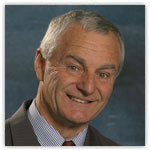 mer
mer
Michael John (Mick) Palmer is a 33 year career police officer with extensive experience in police leadership and reform in community, national and international policing. He enjoyed service in both the State/Territory and Federal areas of policing in Australia.
As Commissioner of the AFP, a position he held for 7 years, he was responsible and accountable to the Federal Government for the effective administration and the operations of the Commonwealth Government’s principal law enforcement agency with a mandate to investigate serious, organised and transnational crime and offences against the Commonwealth. In his capacity as Commissioner Northern Territory Police, Fire and Emergency Services, he held the position of NT Counter Disaster Controller with a responsibility for control of the response to natural emergencies and disasters.
Since his retirement from policing in 2001 Mick has conducted a range of inquiries for Federal and State Australian Governments including the Inquiry into the Immigration Detention of Cornelia Rau, the review of the National Crime Authority that led to the formation of the Australian Crime Commission and Inquiries into prison management in Tasmania and Victoria.
In late 2004 Mick was appointed as the Australian Federal Government’s Inspector of Transport Security, a position he held until June 2012.
As the Inspector of Transport Security he was directly responsible to the Federal Minister for Infrastructure and Transport for inquiries into major transport or offshore security incidents that point to a systemic failure or possible weakness of aviation or maritime transport security systems, and for proactive inquiries into identified transport security arrangements. During his time in this position he conducted inquiries and assessments into surface transport security, ferry security, maritime piracy and offshore
Geof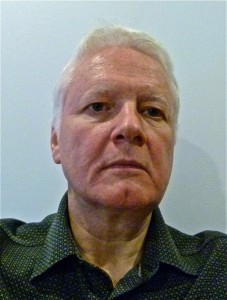 f Monaghan
f Monaghan
Geoff Monaghan is a Research Fellow with the Semeion Research Center for the Science of Communication, Rome Italy (www.semeion.it ). A former career detective with the Metropolitan Police Service (MPS), London, he is an acknowledged authority on global drug trafficking trends and associated policing strategies and tactics, the role of police services in preventing HIV and drug related crime, harm reduction and UK drug policy and legislation. Whilst serving as a police officer he received a number of awards including a Commissioner’s Commendation for Courage in 1984, a Deputy Assistant Commissioner’s Commendation for detective ability in 1988 and an Assistant Commissioner’s Commendation for leadership and detective ability in 1997. In 2003, the Association of Chief Police Officers (ACPO) awarded him a Certificate of Commendation for: “…outstanding contribution towards the work of the ACPO Drugs Sub- Committee between 1995 and 2000…”.
During his service with the MPS, Geoff served on the Central Drug Squad, the Special Intelligence Section (specialising in Jamaican and Turkish organised crime), the Strategic Analysis Unit, the National Intelligence Model (NIM) Implementation Team and the Drugs Directorate at New Scotland Yard and worked at police stations in the London Boroughs of Croydon, Southwark and Islington. Geoff has also served on a District Drug Squad and burglary, street robbery, rape and murder squads and worked in a Criminal Justice Unit (Crime) where he was responsible for reviewing and supervising police investigation files prior to their submission to the Crown Prosecutor.
From 1989 – 1991, Geoff was a member of the expert committee set up by JUSTICE (the UK section of the International Commission of Jurists) to review the Misuse of Drugs Act 1971; see JUSTICE (1991) Drugs and the Law, London. The report made a number of important recommendations (some of which were implemented) regarding the care of drug users in police detention.
From 1999-2001 he was Staff Officer to the ACPO Drugs Sub-Committee. He retired from the MPS in 2006.
From November 2005 – September 2010, he worked as the Regional Drugs and HIV/AIDS Expert, United Nations Office of Drugs and Crime (UNODC), Moscow, Russia and from September 2010 – December 2011, as the HIV/AIDS Prevention and Care Expert, UNODC, Hanoi, Vietnam. During this period, he was also the UNODC Global Focal Point for HIV and Police Services and a member of UNAIDS Global Task Force on Preventing HIV Among Uniformed Services.
Since 1999, he has been a member of the editorial board of the prestigious international journal Substance Use and Misuse and has authored/co-authored a number of articles and papers on policing and drug control policies.
From 1988 – 2011, he played a leading role in setting up Drug Referral Schemes in London, and a number of cities in Russia and Hanoi, Vietnam. In the period 1999-2005 he conceived and designed the MPS Covert Drug Purchase Database and, in collaboration with mathematicians from Semeion, Rome, conceived and designed the MPS Central Drug Trafficking Database and promoted the use of artificial adaptive systems to analyse MPS drug trafficking data.
Geoff has a wealth of experience in working with police services and State officials responsible for running and overseeing law enforcement agencies in Belarus, Kenya, Russia, the UK, Ukraine and Vietnam. From 2001-2011, he organised 25 study tours for senior police officers and State officials from Russia and Vietnam to the UK, Austria, China, Germany, Israel and Spain. Over the years, he has worked as a consultant for UNAIDS in Ukraine, DFID in Russia and for Futures Group in Kenya. In 2003, whilst working as a consultant to DFID, he instigated and together with Professor William E Butler, co-authored the report HIV/AIDS and Drug Misuse in Russia: Harm Reduction Programmes and the Russian Legal System (International Family Health, London).
Few police officers get involved in drafting legislation but Geoff wrote the draft legislation for the Misuse of Drugs (Amendment) (No.2) Regulations 2003 (Britain) which deals with the lawful supply of drug injecting paraphernalia and the draft legislation for needle and syringe programmes (NSPs) in Kenya (2004) and guidance for NSPs in Russia (2009). He has also devised and run training courses and workshops for police officers and drug workers on HIV prevention, drug referral schemes, drug policy paradigms and police drug enforcement strategies and tactics in the Czech Republic, Kenya, Mauritius, Russia, the UK and Ukraine. In addition, he has also helped devise and write training materials for police officers including the UNODC training manual Harm reduction approaches to preventing and controlling HIV and other diseases: the role of police services.
Geoff is the only police officer in the history of the MPS to have been seconded to the United Nations Office on Drugs and Crime and also a civil society organisation namely, International Family Health, England. As a member of IPAG he was part of the drafting team which produced the LEAHN Statement of Support by Law Enforcement Agents for Harm Reduction and Related Policies for HIV Prevention in November 2012.
From 2012-2013, he was a member of the working group on Drugs and Organized Crime run by the International Security Research Directorate (ISRD) at Chatham House, London and a member of the Modernising Drug Law Enforcement (MDLE) advisory group run by the International Drug Policy Consortium (IDPC), the ISRD and The International Institute for Strategic Studies, London.
In March 2014, as the lead author, Geoff signed a contract with Wildy, Simmonds & Hill Publishing, London, for a book entitled: Harm Reduction and Police Services: a review of laws, policies and practices in 14 English-speaking countries. The book will be published early 2015. He is currently (April 2014) writing a paper on the origins of geographic profiling as an aid to criminal investigations.
His recent consultancies include:
- March 2014: seminar on (a) Police support for harm reduction policies and practices (b) Police drug strategies and tactics: some unresolved critical issues for students at the University of Kent, England
- December 2013: on behalf of the Malaysian AIDS Council, two day seminar at the Royal Malaysia Police Training Centre, Kuala Lumpur, where he delivered a number of presentations to officers on their role in supporting public health policies and practices
- April 2013, on behalf of the John Grieve Centre for Community Policing, London Metropolitan University, Geoff ran two sessions on creative thinking in police services for 1st and 2nd year students of criminology
Geoff is a Global Drug Policy Observatory Associate (International Harm Reduction Unit: http://www.swansea.ac.uk/gdpo/internationalharmreductionunit/), Swansea University, Wales.
He is also an Associate of the London School of Economics (LSE) IDEAS International Drug Policy Project which is a large scale multidisciplinary and cross-regional research undertaking. It has been created to produce a deep strategic re-evaluation of the international drug control system through rigorous academic research and policy analysis: http://www.lse.ac.uk/IDEAS/Projects/IDPP/International-Drug-Policy-Project.aspx
Geoff graduated as a graphic designer in 1974 and in 2008 he became a Fellow of the Royal Society of Arts, London. He lives in London and Hanoi.
Publications
- Monaghan, G. (2013) Stop and think! In Druglink, (November/December), DrugScope, London, pp. 23-25
- Crofts, N., Monaghan, G., James, S., Turner, N., Khan, M. Z. (2013) Law enforcement and drug policy in Southeast Asia in Drug law reform in East and Southeast Asia edited by Crofts, N. and Rahman, F., Lexington Books, USA, pp. 59-70
- Monaghan, G. and Bewley-Taylor, D. (2013) Practical implications of policing alternatives to arrest and prosecution for minor cannabis offences International Drug Policy Consortium, London. pp. 1-31
- Monahan, G. (2013) Alive and kicking in doors in Druglink, (May/June) DrugScope, London. pp. 23-24
- Monaghan, G. and Terzi, S. (2013) The Metropolitan Police Service Central Drug Trafficking Database: Evidence of Need in Intelligent Data Mining in Law Enforcement Analytics New Neural Networks Applied to Real Problems (Eds. Buscema, M. and Tastle, W.) Springer, pp. 89-117
- Bewley-Taylor, D. and Monaghan, G. (2013) Police support for harm reduction policies and practices towards people who inject drugs International Drug Policy Consortium, London. pp. 1-20 (also available in Malay and Spanish)
- Jardine, M., Crofts, N., Monaghan, G., Morrow, M. (2012) Harm reduction and law enforcement in Vietnam: influences on street policing in The Impact of Harm Reduction Programs on Law Enforcement in Southeast Asia: What Works and What Doesn’t Harm Reduction Journal Special Issue: Policing and Harm Reduction in SE Asia published 8 July 2012, pp. 61-76
- Monaghan, G. (2012) Harm Reduction and the Role of Police Services in Harm Reduction in Substance Use and High-risk Behaviour (Eds. Riley, D. M. and Pates, R.) Wiley-Blackwell Addiction Press, pp. 59-76
- Riley, D., Pates, R., Monaghan, G., O’Hare, P. (2012) A brief history of harm reduction in Harm Reduction in Substance Use and High-risk Behaviour (Eds. Riley, D. M. and Pates, R.) Wiley-Blackwell Addiction Press, pp. 5-16
- Carpentier, C., Noor, A., Monaghan, G. et el. (2010) Guidelines for collecting data on retail drug prices in Europe: issues and challenges EMCDDA, Lisbon, April 2010, pp. 1-132
- Rhodes, T., Platt, L., Sarang, A., Vlasov, A., Mikhailova, L. and Monaghan, G. (2006) Street policing, injecting drug use and harm reduction in a Russian city: a qualitative study of police perspectives Journal of Urban Health, 2006 September; 83(5): pp. 911-25
- Monaghan, G. (2002) Poppy Seeds and Opiate Concentration in Urine (2002) in Substance Use & Misuse, 37 (4), pp. 571 – 572
- Monaghan, G. (2002) Reclassification of Cannabis: Easy as A, B, C? in Druglink, (January/February 2002), DrugScope, London. pp. 7 – 9
- Monaghan, G (2001) Daily Challenges to Policing in a Democracy: Notes from the Frontline in Policing, Security and Democracy: Special aspects of ‘Democratic Policing’ (2001) (Eds. Einstein, S and Amir, M.) Office of International Justice, Texas, USA. pp. 127 – 176
- Monaghan, G. and White, T. (1999) Case Disposal Options for Drug Offenders Association of Chief Police Officers of England, Wales and Northern Ireland (ACPO), London
- Monaghan, G. (1999) Legal problems for arrest referral? in Druglink, (March/April) ISDD, London, p. 9
- Monaghan, G (1999) Harm Reduction or Harm Production: Policing drugs in London in Drug Use in London (Edited by Stimson, G.V., Fitch, C. and Judd, A.) The Centre for Research on Drugs and Health, London pp. 75 – 92
- Monaghan, G (1994) Race and drug policing in London in Druglink (July/August ISDD, London. p. 9
- Monaghan, G (1993) Trends in UK drug enforcement in The International Drug Trade: Finding the West Country Connection (1993) CIIR Seminar Papers, CIIR, London. pp. 33 – 38
- Monaghan, G. (1991) Powers of arrest for cannabis in Druglink (January/February) ISDD, London, p. 15
Skype: geoff.29



